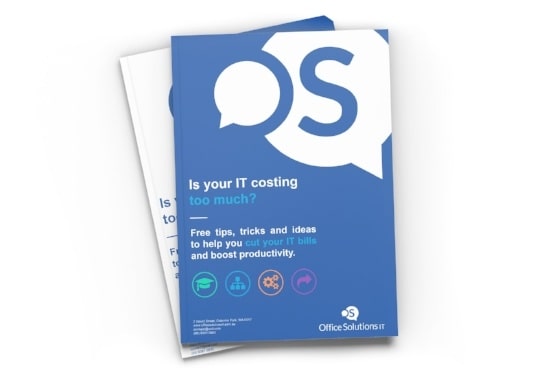Editor's Note: This post was originally published in November 2017 and has been completely updated for accuracy and comprehensiveness.
Confusion often surrounds what Information Technology (IT) support entails. So, it's not uncommon for business owners to question whether or not they need IT assistance.
Naturally, IT is vital to the functioning of any successful business. So, it makes sense to tweak and maintain an IT system, to ensure its optimum efficiency. However, many business owners aren't qualified to do this themselves, so they need to outsource this task. We'll explain why in further detail throughout this article.
There are a few things premium IT support should offer. So, we've taken the liberty of listing a few of them below:
What is Effective IT support?
The basics of IT support as the Cambridge Dictionary defines it:
"Technical help or knowledge provided by computing experts."
The more substantial definition is IT support is a service that helps you with all your IT queries. However, the trick is to find a service that anticipates your IT problems before they even happen (proactive rather than reactive). This should include any online threats your business could encounter or software/hardware decreasing productivity rates.
Excellent IT support should be flexible enough to tailor itself to further your company's aims. Thus, helping your business reach its full potential.
Who is IT support for?
IT support is available for people/companies who pay for a service or have purchased a product.
For example, when you purchase a phone, you typically get free support service (or warranty) for a time to ensure that the customer has a great experience with the device, especially if they encounter any technical issues from time to time. If your IT support has expired for that device, you can always find someone that can do it for you for free or for a fee, depending on the damage to the device.
It’s the same for companies.
Whether they pay for a service or acquire a product, they will require IT support to ensure smooth and effective operations. Depending on your company size and how often you require support help, you may need to build an in-house IT support team or hire an MSP.
What Should Your IT Support Company Be Able to Do?
Your chosen IT support should be confident in resolving any technical issues you may face. So, they should be familiar with any applications, software, and technology you're using. They should also be able to provide you with general IT advice and practical suggestions for improving your present system and productivity.
IT Reporting
High-quality support should always go the extra mile. For example, IT reporting. It's an easy way for you to stay up to date on the state of your IT system and should include a financial breakdown. This means you're able to see precisely where your money is going.
For instance, have you ever considered how much it costs to keep an old computer going? A quality financial IT report gets calculated using warranty and licensing renewals, the current software, the health and age of equipment, the backup status, and security information. A monthly report is preferable so that you can see all aspects of your IT system.
Ideally, the service you select should be a team - not just an individual. A team of people is the right size because they can get to know your business well and provide you with the full support you need. Plus, if something goes wrong, there's the capacity to work on the existing backup plan that should be ready to implement. Consequently, you can be confident that your business will be up and running in no time.
Maintenance & Monitoring
IT maintenance and monitoring are essential to keep your systems afloat. So, whether you’re using your personal computer or managing company-wide servers, you need to keep everything secure and stable to ensure everything is running smoothly.
But aside from efficiency, IT maintenance and monitoring also offer these two advantages for you:
- Increase productivity: As both hardware and software age over time, you will need consistent maintenance and monitoring or else you’re up for expensive downtime. When you maintain and monitor your IT, you prevent disasters like system glitches, slow computers, and even malware attacks. And aside from all that, you can discover how to make your system more efficient by automating certain tasks and applying the best tools according to your goals.
- Improved IT security: Cyber risks are so dangerous that all it takes is one cyber attack to bring your business down to its knees. Once you’re under a cyber attack, not only does your computer equipment get damaged, but so will your confidential data. When you use efficient IT maintenance and monitoring systems like antivirus, firewalls, consistent penetration testing, etc., you detect problems before they find you. This process will give you the upper hand to fight against threats and efficiently eliminate them.
If you need help with your business IT monitoring and maintenance, OSIT will provide you with the appropriate skills and resources to maintain your IT integrity. We’ve worked with many SMBs and large corporations and have delivered impeccable technological solutions that move businesses forward.
Disaster Recovery & Backup
Disaster recovery and backup strategies are essential in damage control during downtime. We’ve seen countless businesses over the years lose revenue over preventable IT disruptions if they have disaster recovery and backup.
But it’s not all security breaches that cause downtime. Natural disasters like earthquakes, fires, and even light human error can jeopardise your IT integrity. So to protect your and your customer's interests, you need to set up backup and recovery strategies that'll help you get back up and running without issue whenever a disaster strikes.
With a reliable IT support company, you can create an updated backup of your company files and data, store it on a secure cloud data facility, and access it anytime when there’s a need to recover your data after a disaster.
Technical Help Desk
Whenever your IT is acting up, the first person you call is the help desk technician. They are the ones who assist you with any IT-related problems, as well as provide you with the necessary information, advice, and direction to help you with your technical difficulties.
Help desk technicians are trained to troubleshoot basic (application how-to, account access, etc.) issues/questions and walk you through the right solutions for them promptly. If you’re looking to solve a more advanced IT problem, a tech support agent will handle it for you.
In-house or Outsourced IT Support?
Many businesses have an in-house IT department. Others hire a Managed IT Service Provider to handle their IT full-time, while a few have both. And yet many still struggle to decide which is the best option for their IT needs.
A reliable IT support provider will advise you on the best options depending on your needs and budget among other factors. They should be able to offer you a cost-effective service that can range from IT support, cyber security, consulting, help desk, cloud computing, and more.
Although in-house IT support typically can provide the sufficient output required for a business, it is sometimes insufficient in certain situations. So you’ll be required to outsource some parts of your IT to professionals to keep up with the demand.
In the end, there won’t be any clear answer to which type of IT support is better. The goal is to figure out which will work best for your business and goals.
Although both in-house and outsourced IT support have their own merits, they also have their disadvantages.
While having a full-time internal IT staff lets you fully control your IT, they can be expensive. And while outsourcing to an MSP can be more cost-effective and proactive, you’ll be giving up some or most of the control of your IT to them.
So, choose wisely.
Why Does My Business Need IT Support?
For starters, dealing with IT-related issues can be a massive time waster for you and your staff. This is usually an area that requires expertise. So, it's often quicker and more convenient to outsource these problems to a company whose ability is to provide a reliable service.
This solution is usually more cost-effective because it lets you focus all your time on those all-important income-producing activities. Additionally, IT support can confirm whether your present system complements your business strategy or not.
If not, you can seek their advice and make the necessary changes.
Needless to say, this will increase profits in the long run.
Our final, yet most crucial point is that you don't want to be continually reacting to IT issues. You need a trained expert to analyse your current system and fix the likelihood of a fault occurring. Then, you can plan for these problems and minimise the chances of them happening in the first place, nipping unnecessary stress in the bud.
If you're looking for someone to manage all your IT support needs, please feel free to speak to one of our friendly staff members, and they'll happily provide you with further information.













